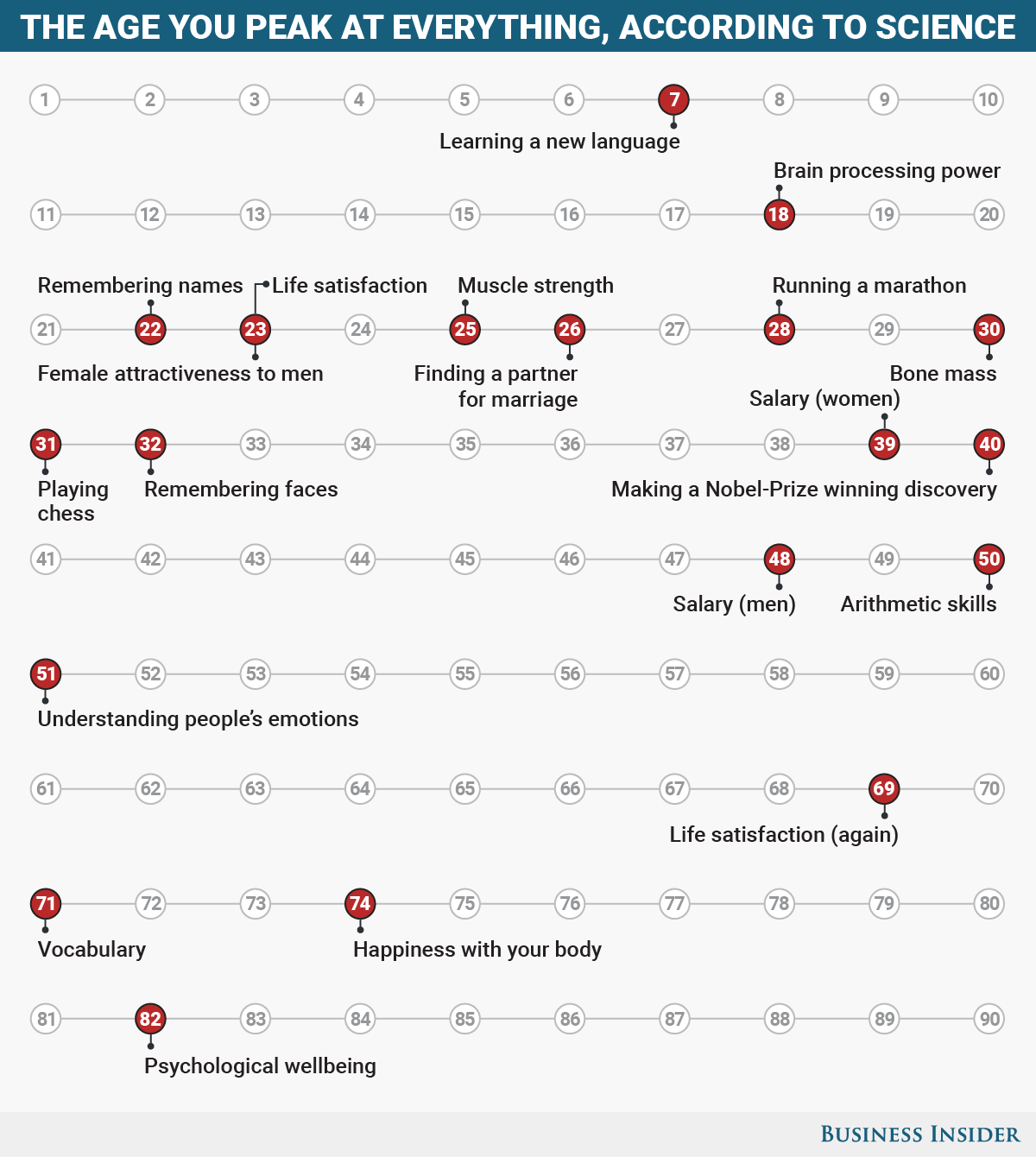So You Think You’ve “Peaked.” Probably Not – Read On!

A question came up recently on Quora.com that intrigued me and motivated me to put the pencil to paper with a response. The question asked:
“At what age is your prime age?”
Fertile ground for thought and opinion, don’t you agree?
So I stepped up with my two cents worth. Here’s an expanded version.
There would seem, to me, to be two different types of prime: physical and psychological.
Physical prime is easier to define. Generally, we reach our physical prime in our mid-to-late 20’s and a gradual decline begins from there. My understanding is that this physical decline in terms of muscle mass and strength really begins to accelerate in the mid-to-late-thirties and picks up serious speed as we approach our fifties unless offset through strength training.
Mental prime may be more elusive as it would seem to be unique to each of us and have so many dimensions. Your psychological/emotional prime is likely to look different and have a different timeline than mine or everyone else’s.
I did some research and found this interesting article on the topic published in 2017 by Business Insider:
Here Are The Ages You Peak at Everything Throughout Life
Here’s the chart that they developed which shows interesting prime ages for a broad selection of phenomena:

As the article emphasized, this is not a controlled study and the points mark the middle of an age range. So these are averages. That’s important for you, my readers, to know because you are all above average on so many levels.
Some things are pretty obvious. For instance, you’re 60 and deciding to learn to speak Russian. Good luck with that. It appears you are 5 decades too late to expect significant results from that worthwhile mental-gymnastics effort.
Double-dipping “Life Satisfaction”
It’s interesting to note, from the chart, that life satisfaction pops up peaking in two spots: age 23 and again at 69 but with psychological wellbeing peaking at 82. This is all according to science.
At 79, I honestly don’t remember what my life satisfaction level was at 23. I was between stints in college and mostly a “wandering generality” into muscle cars and bar hopping. Maybe it’s saying that there is some life satisfaction in wanderlust which was a pretty popular lifestyle with the reprobates I hung with in mid-1960s Cheyenne, Wyoming. Fortunately, sanity returned and I went back for my third and final run at a college degree (P.S. I succeeded). My biggest contribution through that meandering stretch was to the economic welfare of pubs and gas stations.
I will, on the other hand, attest to there being greater life satisfaction at 69 – and in the 10 years since – than all the earlier times in my life. But then, that’s just me. It was in my seventh decade that I grew to realize that my “good spots” came when I stayed true to my birthright of uniqueness and didn’t succumb to other people’s opinions and the pressure of cultural expectations. Unfortunately, it took me that long to recognize and acknowledge that uniqueness – or, as I wrote last week, my “inclinations.”
That discovery, in and of itself, is not an easy or common one. So few of us ever acknowledge and honor our true inborn giftedness. Our culture snags us with our outdated educational system, pounds us with cultural expectations, and hooks us into a life built around comparison instead of our uniqueness.
I’m reminded of the article written by Australian hospice nurse, Bronnie Ware, who spent many years with patients who were in the last few weeks of their lives and who had gone home to die. In her article “Regrets of the Dying, she shares the five most common regrets that they expressed in their final days. Far and away, the most common regret was:
“I wish I’d had the courage to live a life true to myself, not the life others expected of me.”
Age 82 is a head-fake!
I don’t expect anyone in my cohort to claim they haven’t passed their physical peak. They know my bull**** filter, albeit not great, wouldn’t let that one through.
But what about that “psychological wellbeing” peak at 82? Seems kinda early, don’t ya think? Couldn’t we move that one out another decade or two – and make it a really brief peak, like overnight, maybe? As in “die young, as late as possible.” Sort of like the Okinawans have tended to do – live happy and purposeful close to 100 and then check out with virtually no morbidity period. Unlike we Americans with our average 10 1/2 years of morbidity.
What’s the Okinawan magic? Prior to being invaded and infected with western culture, it was mostly a strong sense of purpose built around community and family combined with non-western lifestyle diet and movement choices. Historically, Okinawans haven’t relinquished their identity and sense of purpose to retirement – they have no word for the concept in their vocabulary.
So maybe we move that 82 to 92 or 97 or – heaven forbid – to 102. Rather than hopping off the cliff from labor-to-leisure at the “obligatory 65”, we turn our retirement into a purposeful, service-filled period that is balanced with labor, leisure, and learning. Your thing, built around your “inclinations”, on your timetable, at your speed, in whatever form you choose but with an eye to changing something that needs changing.
Why not? Remember, these are all averages – and you’re not!
Hope you are coming out of this COVID year unscathed. We appreciate you sticking around and giving us a read. Let us know your thoughts on this peak issue. Scroll down and leave a comment or drop me an email at gary@makeagingwork.com
Oh, by the way. I just launched my new website for the other part of my life – my resume writing, LinkedIn presence development, and career transition and retirement coaching. Give us a visit over at www.turningpointcareerservices.com and schedule a call if you would like to discuss any of the services I’m offering.






 So, you’re tired and can’t wait for retirement because you bought the Koolaid that retirement is the relief you need from a life and “job” that, on a good day, injects an unhealthy dose of cortisol (hint: stress hormone) and has nothing to do with those inclinations you tormented your parents with at age 9 or 10.
So, you’re tired and can’t wait for retirement because you bought the Koolaid that retirement is the relief you need from a life and “job” that, on a good day, injects an unhealthy dose of cortisol (hint: stress hormone) and has nothing to do with those inclinations you tormented your parents with at age 9 or 10.





